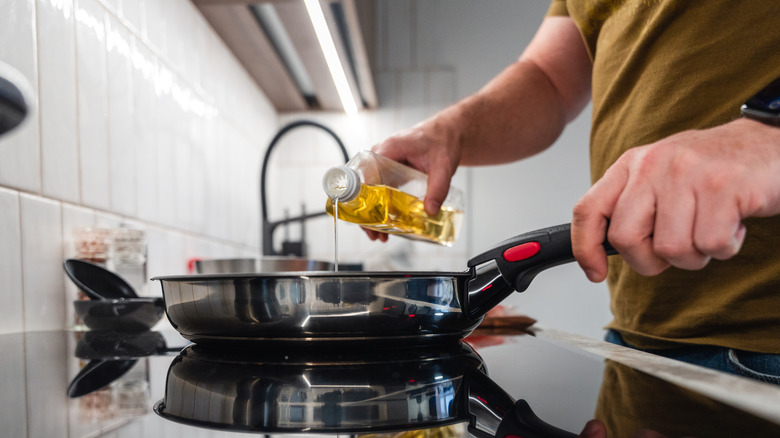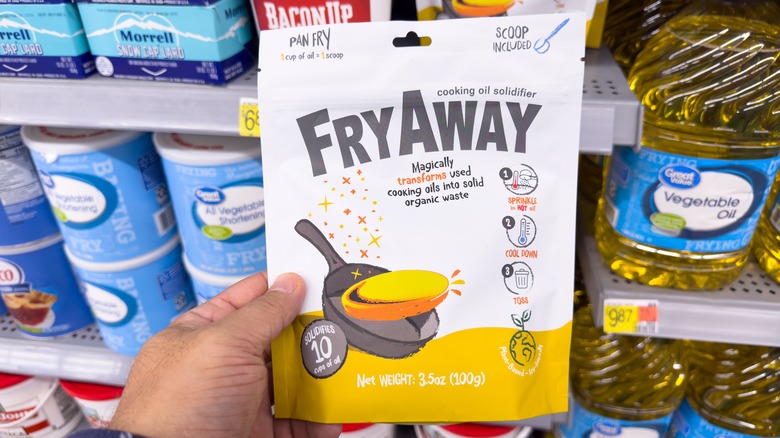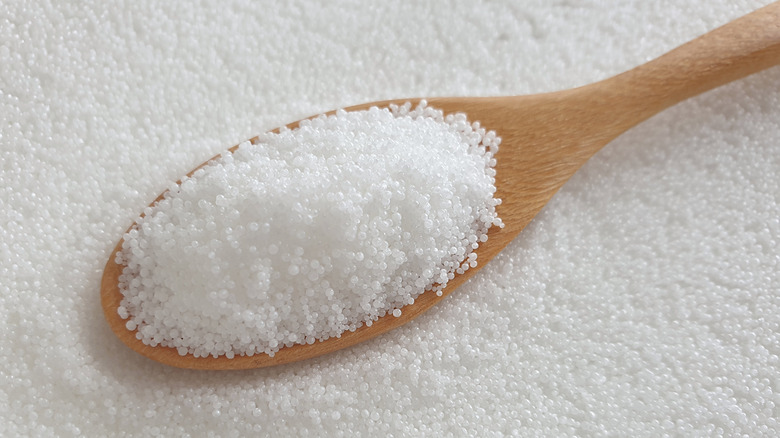The Mess-Free Way To Throw Out Cooking Oil
Deep-frying food is time consuming, messy, and dangerous. But personally, I think the worst part comes after dinner when you're figuring out what to do with the leftover oil. Sure, you can reuse it a few times, but leftover frying oil won't last forever. What should you do when it's spent?
Pouring oil down the drain will cause clogged pipes and fatbergs, the bane of sewage treatment plants. You can sop smaller amounts up with paper towels, but you'll quickly end up wasting most of a roll. I usually toss used cooking oil out in an old bottle or jar, but I always worry about leaks on the way to the landfill since it'll harm local wildlife if it finds its way into waterways.
That's why oil solidifiers are revolutionary. Add a scoop to a pot of hot oil and it'll turn into one solid, gelatinous, non-toxic piece that you can toss out with the rest of your waste. Fans say it's a more eco-friendly option since, unlike oil trapped in bottles, solidified oil will decompose in the landfill. You can even toss small amounts into compost piles.
While oil solidifiers are certainly an eco-friendly option, experts disagree with claims they are the most eco-friendly cooking oil disposal technique. The absolute best way to dispose of oil (environmentally speaking) is through oil recycling programs which turn used cooking oil into biodiesel fuel. Curbside oil recycling is rare, but it's worthwhile to look for options in your area.
What are oil solidifiers and how do you use them?
Don't confuse oil solidifiers with gelatin. Gelatin can help purify oil by removing all the gross gunk from your last deep fry, but it leaves leftover oil behind. It's not an option for vegan, vegetarian, Kosher, or Halal diets, either. Oil solidifiers are guilt-free, though, since they often use plant-based ingredients.
Oil solidifiers hit the Japanese market decades ago, but they're just starting to catch on in the United States. That's partially due to American entrepreneur Laura Lady. Since the former "Shark Tank" contestant launched a line of oil solidifiers under the name FryAway, they've become more accessible — and better known — to American customers. You can now find FryAway at Walmart instead of needing to ship in solidifiers from Japan.
Oil solidifiers typically have a flaky or powdery appearance. The package should tell you how much to use, but it varies depending on whether you're pan frying or deep frying. Avoid using too much since, if the oil gets too hard, you'll have trouble removing it from the pan.
Sprinkle the powder into the hot oil and stir well. Ideally, the oil should be well below the ultra-hot temperatures used for deep frying, but don't let it cool completely. The sweet spot is around 170 degrees Fahrenheit. The oil should solidify in under an hour, but it'll depend on the amount of oil, the amount of product, and the temperature of the room. Scrape the oil out of the pan and into the trash once it solidifies.
What's in oil solidifiers?
FryAway doesn't reveal exactly how its products work, but there are speculations that the main ingredient is stearic acid. The naturally occurring fatty acid found in plant and animal fats emulsifies with oil and raises its melting point. Once the oil and stearic acid are combined, the oil solidifies at room temperature. Because the product is patent-pending, the company hasn't disclosed specific details just yet, but the company has confirmed stearic acid is an ingredient.
Grabbing a package of FryAway on your next Walmart run might be convenient, but stearic acid is readily available online for much, much cheaper. Unlike products sold as kitchen oil solidifiers, stearic acid won't come portioned out in packets if you buy it in bulk. It might take a little trial and error to figure out how much you need, but if you're looking to save money you could start with two or three tablespoons per cup of oil.
You can also check stores that sell supplies for candle making or DIY cosmetics since stearic acid is often used as a stabilizer in makeup and candles. Just make sure to double-check the descriptions if you're trying to avoid animal products. Some stearic acid is made from animal fats.


